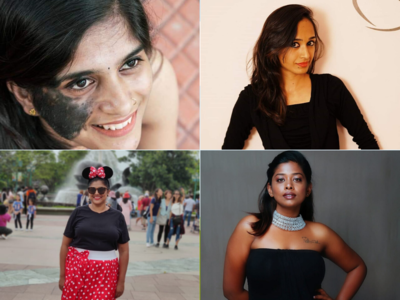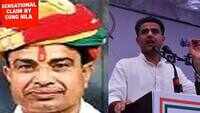
In the early 2000s, actor Shalini Satyanarayan played the role of overweight and overbearing housewife in a TV show. That formulaic image stuck and even today, she’s expected to portray characters built around her weight and appearance. Then there are the trolls, constantly mocking or advising her to work on her body.
“I have faced enough body shamers. For years, I took the opinions with a grain of salt, but I decided to take a stand when one guy intimidated me on social media. No one has the right to talk about someone’s body,” she says.
Shalini and many other women are pushing back against a tide of unkind and ill-informed judgements online and flawed ideals of health and beauty (“thin and fair are desirable”, “fat is unattractive”), and are driving the body-positive movement, also called ‘BoPo’.
This community of social-media influencers focuses on body acceptance and love and emotional well-being, countering countless Instagram accounts and photos that, actively or unwittingly, set unrealistic standards of physical appearance and pressure women to watch their weight or seek online affirmation.
“Why should you comment on someone’s body or looks when you have no idea what battles the person is fighting?” asks Shalini.
Bengaluru-based make-up artist Vydurya Lokesh tried to hide her olive skin after facing ridicule. “In school, I was body-shamed and called names for being dark-skinned. That affected me for a long time,” she says. Vydurya worked hard to overcome insecurities and now spreads the message on self-acceptance and pride on Instagram. “The real representation of beauty is being absolutely comfortable in your skin,” she wrote on Saturday.
In an earlier post, she said: “It’s real and true that we South Indian girls are loaded with uneven skin tone and pigmentation, more like they’re your free takeaways. But it takes a while to accept these parts of you in a society that’s screaming out the ideals of beauty time and again.”
Films and television shows share considerable blame for promoting stereotypes and attaching negative qualities to certain body and skin types.
The flawed depictions do a lot of harm in society, causing problems such as childhood bullying and personality development issues. The body-positive campaign, which occupies a prominent spot in digital spaces now, seeks to address this. It’s not limited to weight acceptance; it also encourages discussions to reshape views on self-expression and identity.
“We, as a society, have normalised body shaming to an extent that it’s passed off as a harmless joke. Nobody wants to understand the health part or take the effort to know the person they are commenting on,” says Shalini.
“It’s not easy for everyone to accept themselves; it took me years. I am happy with my body now. If my weight or appearance is bothering someone, they should learn to make peace with it.”
Journalist Mandara was born with a facial birthmark. For years, she avoided mirrors and socialising.
“I come from a small village in coastal Karnataka; there are only 10 houses there. The insult and humiliation from a few neighbours and relatives made my life difficult. After undergoing painful laser treatments, I came to terms with myself,” she says.
“I now believe this mark enhances my individuality. The support on social media improved my confidence, and I decided to face it all, including the mirror.”
Vydurya often gets requests from brides to make them look fairer. “I like to keep it real, though I understand the stigma. I used to pick up the brush to make myself look pretty, but the minute the make-up wears off the insecurity returns. The key is to take charge to build confidence,” she says.
“Every skin tone is beautiful. Make-up can enhance your beauty; it can’t be an escape.”
Actor and YouTuber Urvashi Goverdhan’s love-hate relationship with weight made her a strong advocate of body acceptance. “Behind every perfect photo on e-commerce sites, there are hundreds that are rejected as they do not conform to certain norms. The photos that make the cut are nowhere close to reality,” she says.
Vasundhara, a techie, finds skinny shaming to be an equally toxic culture. “I grew up hearing things like ‘real men like curves, only dogs like bones’, ‘you are flat like a carrom board’ and ‘are you malnourished?’,” she says. “I have always been skinny. Often, I cried, hating my body. But I have learned to accept myself. I am body positive.”
“I have faced enough body shamers. For years, I took the opinions with a grain of salt, but I decided to take a stand when one guy intimidated me on social media. No one has the right to talk about someone’s body,” she says.
Shalini and many other women are pushing back against a tide of unkind and ill-informed judgements online and flawed ideals of health and beauty (“thin and fair are desirable”, “fat is unattractive”), and are driving the body-positive movement, also called ‘BoPo’.
This community of social-media influencers focuses on body acceptance and love and emotional well-being, countering countless Instagram accounts and photos that, actively or unwittingly, set unrealistic standards of physical appearance and pressure women to watch their weight or seek online affirmation.
“Why should you comment on someone’s body or looks when you have no idea what battles the person is fighting?” asks Shalini.
Bengaluru-based make-up artist Vydurya Lokesh tried to hide her olive skin after facing ridicule. “In school, I was body-shamed and called names for being dark-skinned. That affected me for a long time,” she says. Vydurya worked hard to overcome insecurities and now spreads the message on self-acceptance and pride on Instagram. “The real representation of beauty is being absolutely comfortable in your skin,” she wrote on Saturday.
In an earlier post, she said: “It’s real and true that we South Indian girls are loaded with uneven skin tone and pigmentation, more like they’re your free takeaways. But it takes a while to accept these parts of you in a society that’s screaming out the ideals of beauty time and again.”
Films and television shows share considerable blame for promoting stereotypes and attaching negative qualities to certain body and skin types.
The flawed depictions do a lot of harm in society, causing problems such as childhood bullying and personality development issues. The body-positive campaign, which occupies a prominent spot in digital spaces now, seeks to address this. It’s not limited to weight acceptance; it also encourages discussions to reshape views on self-expression and identity.
“We, as a society, have normalised body shaming to an extent that it’s passed off as a harmless joke. Nobody wants to understand the health part or take the effort to know the person they are commenting on,” says Shalini.
“It’s not easy for everyone to accept themselves; it took me years. I am happy with my body now. If my weight or appearance is bothering someone, they should learn to make peace with it.”
Journalist Mandara was born with a facial birthmark. For years, she avoided mirrors and socialising.
“I come from a small village in coastal Karnataka; there are only 10 houses there. The insult and humiliation from a few neighbours and relatives made my life difficult. After undergoing painful laser treatments, I came to terms with myself,” she says.
“I now believe this mark enhances my individuality. The support on social media improved my confidence, and I decided to face it all, including the mirror.”
Vydurya often gets requests from brides to make them look fairer. “I like to keep it real, though I understand the stigma. I used to pick up the brush to make myself look pretty, but the minute the make-up wears off the insecurity returns. The key is to take charge to build confidence,” she says.
“Every skin tone is beautiful. Make-up can enhance your beauty; it can’t be an escape.”
Actor and YouTuber Urvashi Goverdhan’s love-hate relationship with weight made her a strong advocate of body acceptance. “Behind every perfect photo on e-commerce sites, there are hundreds that are rejected as they do not conform to certain norms. The photos that make the cut are nowhere close to reality,” she says.
Vasundhara, a techie, finds skinny shaming to be an equally toxic culture. “I grew up hearing things like ‘real men like curves, only dogs like bones’, ‘you are flat like a carrom board’ and ‘are you malnourished?’,” she says. “I have always been skinny. Often, I cried, hating my body. But I have learned to accept myself. I am body positive.”

Coronavirus outbreak
Trending Topics
LATEST VIDEOS
City
 Shocking: Dalit man stripped, mercilessly beaten up in Karnataka
Shocking: Dalit man stripped, mercilessly beaten up in Karnataka  Sachin Pilot offered me Rs 35 crore to join BJP, sensational claim by Congress MLA
Sachin Pilot offered me Rs 35 crore to join BJP, sensational claim by Congress MLA  Uttar Pradesh: No masks, no social distancing, BJP MLA visits temple, offers prayers
Uttar Pradesh: No masks, no social distancing, BJP MLA visits temple, offers prayers  Shocker from UP: Water gushes through roof of Bareilly hospital's Covid-19 ward
Shocker from UP: Water gushes through roof of Bareilly hospital's Covid-19 ward
More from TOI
Navbharat Times
Featured Today in Travel
Get the app





